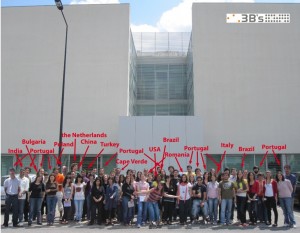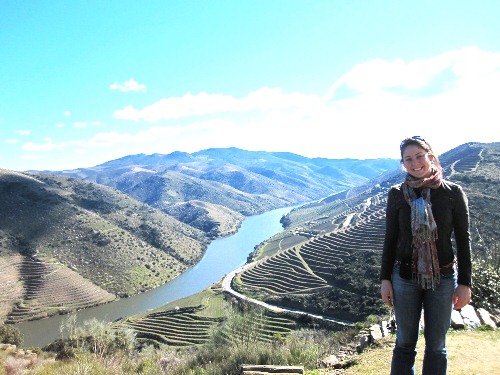As a Fulbrighter to Portugal, I conducted biomedical engineering research in the 3B’s (Biomaterials, Biodegradables and Biomimetics) Research Group at the University of Minho’s Department of Polymer Engineering. I developed “smart” materials that can control the body’s cell behavior; a technology that might be useful for promoting new blood vessel growth in heart tissue after a heart attack, or for producing functioning tissues like cartilage and bone from stem cells. The Department’s lab is also the headquarters of the European Institute of Excellence on Tissue Engineering and Regenerative Medicine, which places special emphasis on international collaboration. The 3B’s Research Group attracts students and postdocs from all over the world, and collaborates with partner laboratories in 14 countries. The coolest part of my research experience was working on a team comprised of members from diverse backgrounds conducting experiments in Portugal and abroad. The next coolest part was the food!
During the week, I worked in the lab, which had a distinctly Portuguese flair. Everyone ate lunch together and we often dined together in the evenings as well. We also organized lab trips to other European cities. Every weekend, I traveled to a different town in Portugal, a small country with varied landscapes and lots of festivals. The people I met were very friendly and appeared to love Portuguese spoken with an extremely thick American accent. (My first Portuguese lesson was a sign on the doors: PUXE, pronounced “push,” which means “pull.”)
 Having conducted some of my doctoral research in China and my postdoctoral research as a Fulbrighter in Portugal, I believe that international experience should be a requirement for all students, especially those in science and engineering. I loved living in and traveling around Portugal, but what was even more interesting was discovering how one’s science can benefit from learning another language and way of thinking in a different culture. For example, I learned that working on research at a slower, more relaxed pace fosters new ideas, more efficient experiments and an overall more pleasant work experience. In my labs in the United States, I ate lunch while staring at my computer, rushing to finish my work so that I could leave and enjoy the rest of my day elsewhere. In Portugal, I socialized with my colleagues during regular coffee breaks and long lunches. We discussed the bioethics of embryonic stem cell technologies, the philosophy of growing tissues in the lab, the politics of global academic research, the nuances of football (both soccer and American football) and the differences between wines from Northern and Southern Portugal. We often spent 10-12 hours per day at work, but they were fun hours. And, when it was time to leave Portugal, I realized that my ideas and experiments had achieved a level of creativity that I had deemed impossible before I left. My colleagues and I submitted an international patent publication and we continue to collaborate on the same project. These kinds of perspective-broadening experiences can only come from studying overseas and are exactly what the Fulbright Program promotes.
Having conducted some of my doctoral research in China and my postdoctoral research as a Fulbrighter in Portugal, I believe that international experience should be a requirement for all students, especially those in science and engineering. I loved living in and traveling around Portugal, but what was even more interesting was discovering how one’s science can benefit from learning another language and way of thinking in a different culture. For example, I learned that working on research at a slower, more relaxed pace fosters new ideas, more efficient experiments and an overall more pleasant work experience. In my labs in the United States, I ate lunch while staring at my computer, rushing to finish my work so that I could leave and enjoy the rest of my day elsewhere. In Portugal, I socialized with my colleagues during regular coffee breaks and long lunches. We discussed the bioethics of embryonic stem cell technologies, the philosophy of growing tissues in the lab, the politics of global academic research, the nuances of football (both soccer and American football) and the differences between wines from Northern and Southern Portugal. We often spent 10-12 hours per day at work, but they were fun hours. And, when it was time to leave Portugal, I realized that my ideas and experiments had achieved a level of creativity that I had deemed impossible before I left. My colleagues and I submitted an international patent publication and we continue to collaborate on the same project. These kinds of perspective-broadening experiences can only come from studying overseas and are exactly what the Fulbright Program promotes.
My advice for prospective Fulbright candidates preparing research/study applications is to take time to learn about your selected country. Consult the Fulbright U.S. Student Program website’s country summaries, but also read about your country’s history and culture, and talk to people who have lived or visited there. The more I learned about Portugal, the more I wanted to study there and I conveyed this in my application.
As far as obtaining an affiliation, I met my research adviser at an academic conference (where he was giving a lecture about the importance of international education for scientists), so that part of the application process was easier for me than anticipated. If you don’t have similar opportunities to identify your host affiliation, then try emailing the organization or person with whom you might work. Explain what you’re interested in, why you’d like to do a Fulbright with that person or organization and what your plans are during and after your grant. Your potential affiliation will not only appreciate that you want to work together, but that you also want to learn more about your host country. Then, once you’ve arrived, make sure to work hard and take advantage of every opportunity to learn something new. Lastly, keep a journal, because the details of your Fulbright experience (that you might forget) are the very best part.
Top Photo: Kara Spiller, 2010-2011, Portugal, visiting the Douro River Valley
Middle Photo: Kara Spiller, 2010-2011, Portugal (center), with members of the University of Minho’s 3B Research Group

